第04讲 名词和代词-2025学年英语初升高知识详细讲解
文档属性
| 名称 | 第04讲 名词和代词-2025学年英语初升高知识详细讲解 | 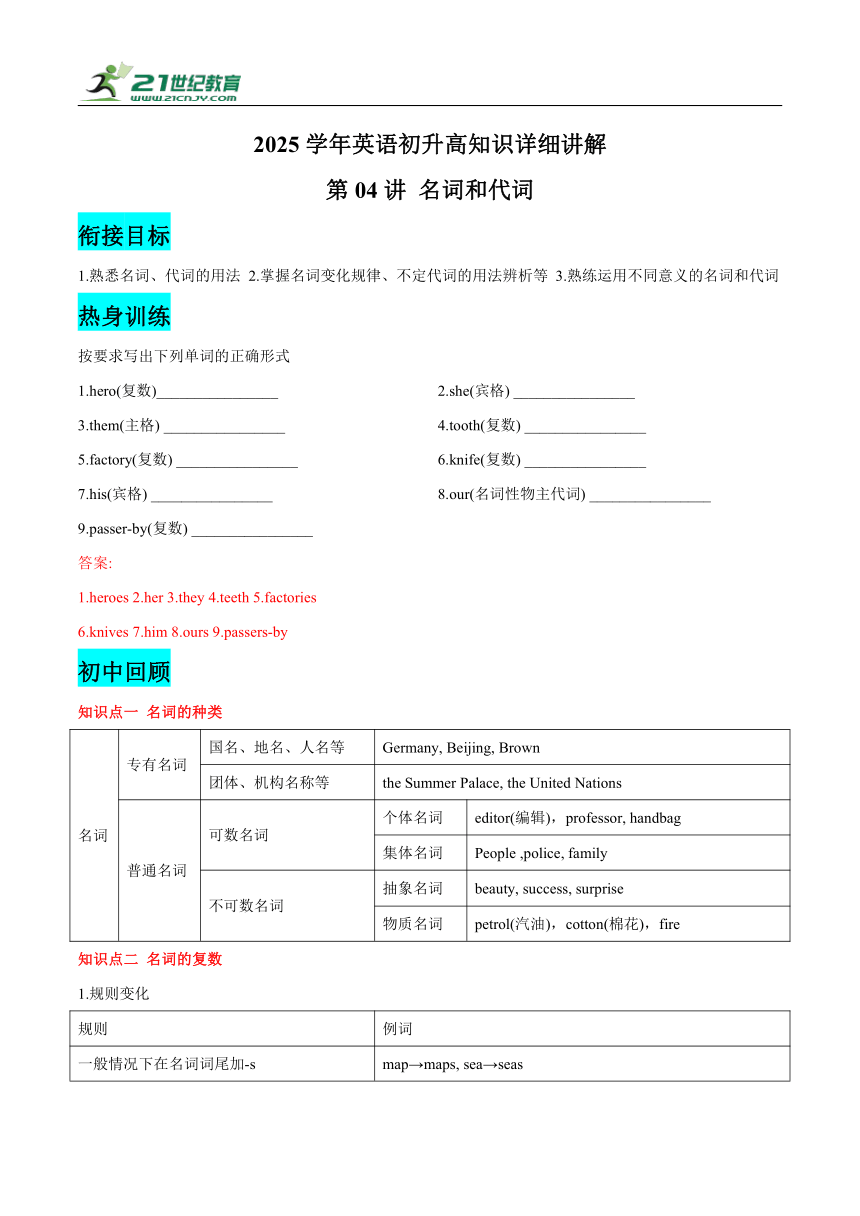 | |
| 格式 | docx | ||
| 文件大小 | 82.9KB | ||
| 资源类型 | 试卷 | ||
| 版本资源 | 人教新目标(Go for it)版 | ||
| 科目 | 英语 | ||
| 更新时间 | 2025-06-20 00:38:13 | ||
图片预览

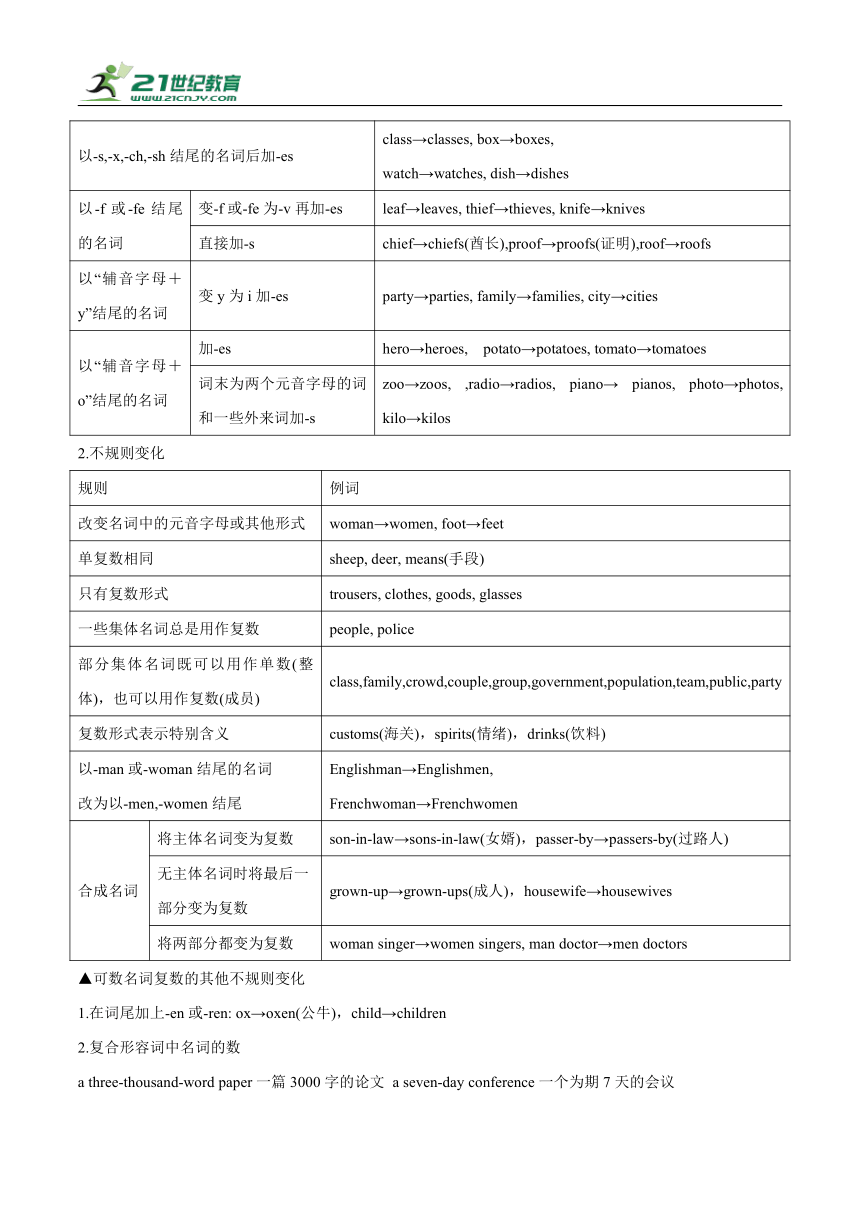
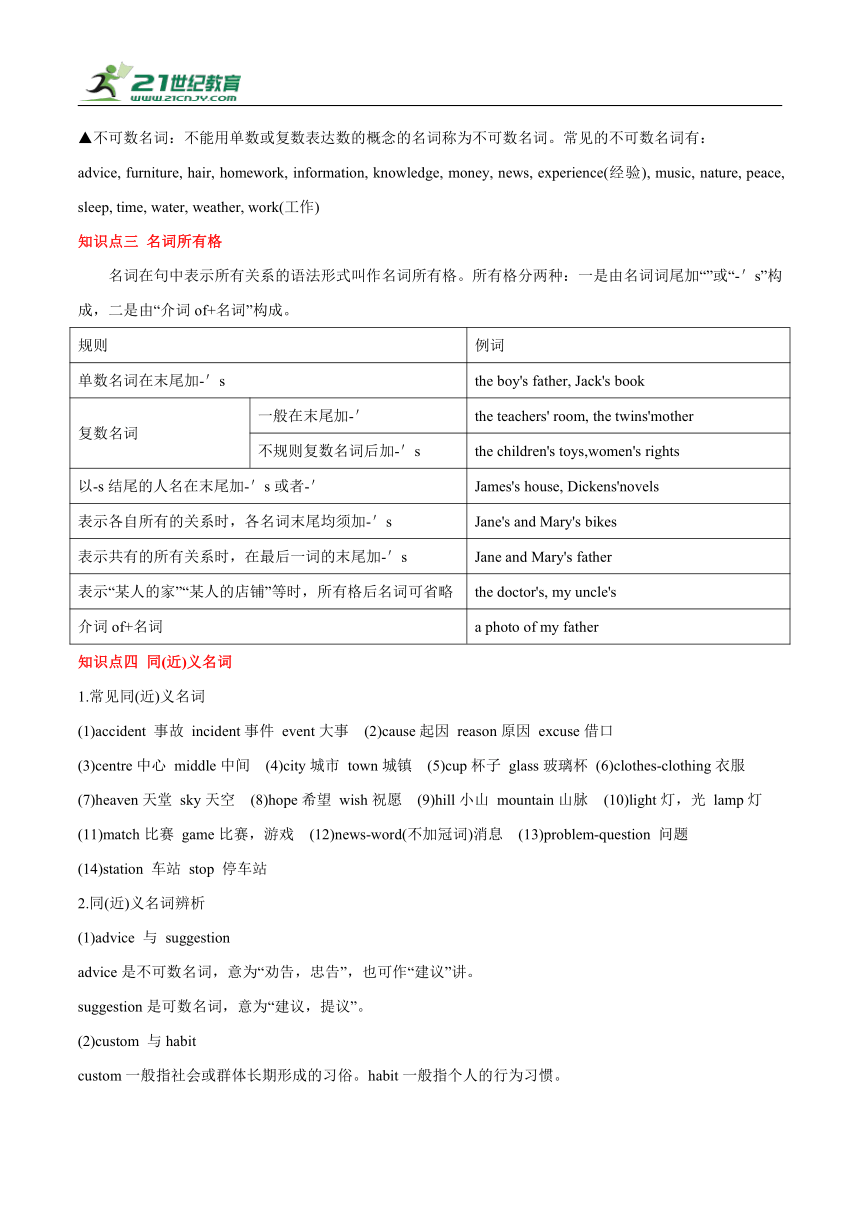
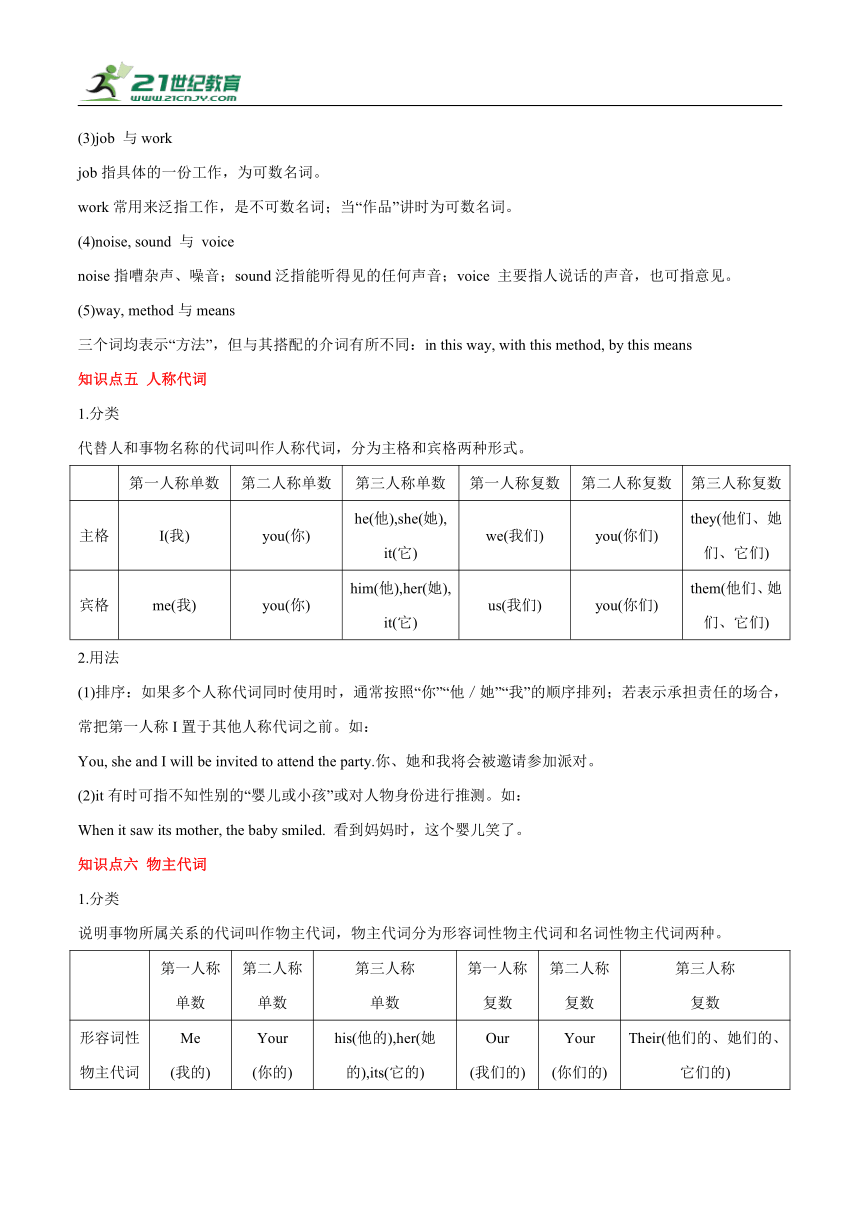
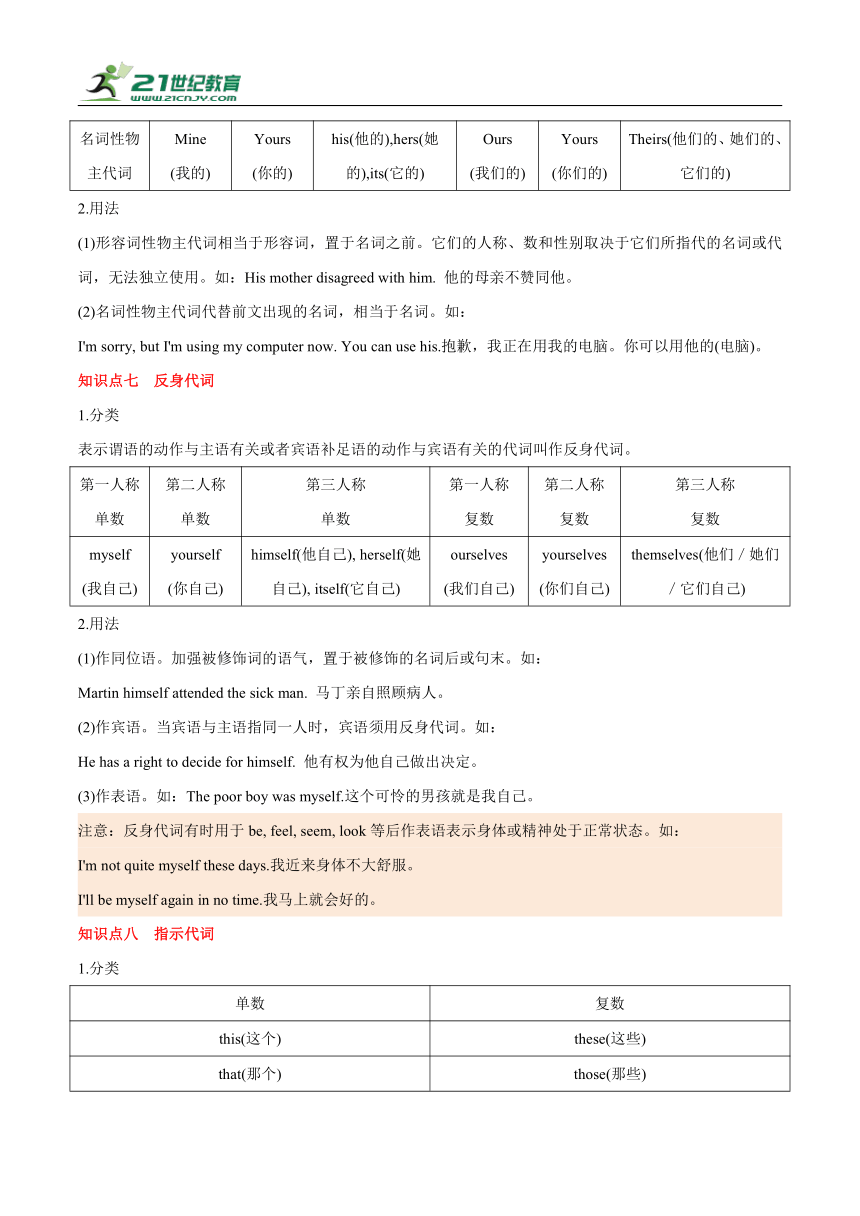
文档简介
2025学年英语初升高知识详细讲解
第04讲 名词和代词
衔接目标
1.熟悉名词、代词的用法 2.掌握名词变化规律、不定代词的用法辨析等 3.熟练运用不同意义的名词和代词
热身训练
按要求写出下列单词的正确形式
1.hero(复数)________________ 2.she(宾格) ________________
3.them(主格) ________________ 4.tooth(复数) ________________
5.factory(复数) ________________ 6.knife(复数) ________________
7.his(宾格) ________________ 8.our(名词性物主代词) ________________
9.passer-by(复数) ________________
答案:
1.heroes 2.her 3.they 4.teeth 5.factories
6.knives 7.him 8.ours 9.passers-by
初中回顾
知识点一 名词的种类
名词 专有名词 国名、地名、人名等 Germany, Beijing, Brown
团体、机构名称等 the Summer Palace, the United Nations
普通名词 可数名词 个体名词 editor(编辑),professor, handbag
集体名词 People ,police, family
不可数名词 抽象名词 beauty, success, surprise
物质名词 petrol(汽油),cotton(棉花),fire
知识点二 名词的复数
1.规则变化
规则 例词
一般情况下在名词词尾加-s map→maps, sea→seas
以-s,-x,-ch,-sh结尾的名词后加-es class→classes, box→boxes, watch→watches, dish→dishes
以-f或-fe结尾的名词 变-f或-fe为-v再加-es leaf→leaves, thief→thieves, knife→knives
直接加-s chief→chiefs(酋长),proof→proofs(证明),roof→roofs
以“辅音字母+y”结尾的名词 变y为i加-es party→parties, family→families, city→cities
以“辅音字母+o”结尾的名词 加-es hero→heroes, potato→potatoes, tomato→tomatoes
词末为两个元音字母的词和一些外来词加-s zoo→zoos, ,radio→radios, piano→ pianos, photo→photos, kilo→kilos
2.不规则变化
规则 例词
改变名词中的元音字母或其他形式 woman→women, foot→feet
单复数相同 sheep, deer, means(手段)
只有复数形式 trousers, clothes, goods, glasses
一些集体名词总是用作复数 people, police
部分集体名词既可以用作单数(整体),也可以用作复数(成员) class,family,crowd,couple,group,government,population,team,public,party
复数形式表示特别含义 customs(海关),spirits(情绪),drinks(饮料)
以-man或-woman结尾的名词 改为以-men,-women结尾 Englishman→Englishmen, Frenchwoman→Frenchwomen
合成名词 将主体名词变为复数 son-in-law→sons-in-law(女婿),passer-by→passers-by(过路人)
无主体名词时将最后一 部分变为复数 grown-up→grown-ups(成人),housewife→housewives
将两部分都变为复数 woman singer→women singers, man doctor→men doctors
▲可数名词复数的其他不规则变化
1.在词尾加上-en或-ren: ox→oxen(公牛),child→children
2.复合形容词中名词的数
a three-thousand-word paper一篇3000字的论文 a seven-day conference一个为期7天的会议
▲不可数名词:不能用单数或复数表达数的概念的名词称为不可数名词。常见的不可数名词有:
advice, furniture, hair, homework, information, knowledge, money, news, experience(经验), music, nature, peace, sleep, time, water, weather, work(工作)
知识点三 名词所有格
名词在句中表示所有关系的语法形式叫作名词所有格。所有格分两种:一是由名词词尾加“”或“-'s”构成,二是由“介词of+名词”构成。
规则 例词
单数名词在末尾加-'s the boy's father, Jack's book
复数名词 一般在末尾加-' the teachers' room, the twins'mother
不规则复数名词后加-'s the children's toys,women's rights
以-s结尾的人名在末尾加-'s或者-' James's house, Dickens'novels
表示各自所有的关系时,各名词末尾均须加-'s Jane's and Mary's bikes
表示共有的所有关系时,在最后一词的末尾加-'s Jane and Mary's father
表示“某人的家”“某人的店铺”等时,所有格后名词可省略 the doctor's, my uncle's
介词of+名词 a photo of my father
知识点四 同(近)义名词
1.常见同(近)义名词
(1)accident 事故 incident事件 event大事 (2)cause起因 reason原因 excuse借口
(3)centre中心 middle中间 (4)city城市 town城镇 (5)cup杯子 glass玻璃杯 (6)clothes-clothing衣服
(7)heaven天堂 sky天空 (8)hope希望 wish祝愿 (9)hill小山 mountain山脉 (10)light灯,光 lamp灯
(11)match比赛 game比赛,游戏 (12)news-word(不加冠词)消息 (13)problem-question 问题
(14)station 车站 stop 停车站
2.同(近)义名词辨析
(1)advice 与 suggestion
advice是不可数名词,意为“劝告,忠告”,也可作“建议”讲。
suggestion是可数名词,意为“建议,提议”。
(2)custom 与habit
custom一般指社会或群体长期形成的习俗。habit一般指个人的行为习惯。
(3)job 与work
job指具体的一份工作,为可数名词。
work常用来泛指工作,是不可数名词;当“作品”讲时为可数名词。
(4)noise, sound 与 voice
noise指嘈杂声、噪音;sound泛指能听得见的任何声音;voice 主要指人说话的声音,也可指意见。
(5)way, method与means
三个词均表示“方法”,但与其搭配的介词有所不同:in this way, with this method, by this means
知识点五 人称代词
1.分类
代替人和事物名称的代词叫作人称代词,分为主格和宾格两种形式。
第一人称单数 第二人称单数 第三人称单数 第一人称复数 第二人称复数 第三人称复数
主格 I(我) you(你) he(他),she(她), it(它) we(我们) you(你们) they(他们、她们、它们)
宾格 me(我) you(你) him(他),her(她), it(它) us(我们) you(你们) them(他们、她们、它们)
2.用法
(1)排序:如果多个人称代词同时使用时,通常按照“你”“他/她”“我”的顺序排列;若表示承担责任的场合,常把第一人称I置于其他人称代词之前。如:
You, she and I will be invited to attend the party.你、她和我将会被邀请参加派对。
(2)it有时可指不知性别的“婴儿或小孩”或对人物身份进行推测。如:
When it saw its mother, the baby smiled. 看到妈妈时,这个婴儿笑了。
知识点六 物主代词
1.分类
说明事物所属关系的代词叫作物主代词,物主代词分为形容词性物主代词和名词性物主代词两种。
第一人称 单数 第二人称 单数 第三人称 单数 第一人称 复数 第二人称 复数 第三人称 复数
形容词性物主代词 Me (我的) Your (你的) his(他的),her(她的),its(它的) Our (我们的) Your (你们的) Their(他们的、她们的、它们的)
名词性物主代词 Mine (我的) Yours (你的) his(他的),hers(她的),its(它的) Ours (我们的) Yours (你们的) Theirs(他们的、她们的、它们的)
2.用法
(1)形容词性物主代词相当于形容词,置于名词之前。它们的人称、数和性别取决于它们所指代的名词或代词,无法独立使用。如:His mother disagreed with him. 他的母亲不赞同他。
(2)名词性物主代词代替前文出现的名词,相当于名词。如:
I'm sorry, but I'm using my computer now. You can use his.抱歉,我正在用我的电脑。你可以用他的(电脑)。
知识点七 反身代词
1.分类
表示谓语的动作与主语有关或者宾语补足语的动作与宾语有关的代词叫作反身代词。
第一人称 单数 第二人称 单数 第三人称 单数 第一人称 复数 第二人称 复数 第三人称 复数
myself (我自己) yourself (你自己) himself(他自己), herself(她自己), itself(它自己) ourselves (我们自己) yourselves (你们自己) themselves(他们/她们/它们自己)
2.用法
(1)作同位语。加强被修饰词的语气,置于被修饰的名词后或句末。如:
Martin himself attended the sick man. 马丁亲自照顾病人。
(2)作宾语。当宾语与主语指同一人时,宾语须用反身代词。如:
He has a right to decide for himself. 他有权为他自己做出决定。
(3)作表语。如:The poor boy was myself.这个可怜的男孩就是我自己。
注意:反身代词有时用于be, feel, seem, look等后作表语表示身体或精神处于正常状态。如:
I'm not quite myself these days.我近来身体不大舒服。
I'll be myself again in no time.我马上就会好的。
知识点八 指示代词
1.分类
单数 复数
this(这个) these(这些)
that(那个) those(那些)
2.用法
(1)this和these指在时间或空间上较近的人或者事物,that和those指在时间或空间上较远的人或者事物。如:
初升高街授
This is a pen and that's an eraser.这是一支钢笔,那是一块橡皮擦。
These are boys and those are girls.这些是男孩,那些是女孩。
(2)打电话过程中,介绍自己时通常用this指代“我”,不用代词I;询问对方时用that指代“你”,不用代词you.如:
-Hello. This is Mary. Who's that 你好。我是玛丽。你是谁?
-This is Tom.我是汤姆。
注意:当指示代词所指的事物已确定时,后面的指示代词则用it或they代替。如:
This suit is expensive, isn't it 这件套装很贵,不是吗?
-Are those yours 那些是你的吗?
-Yes, they are.是的,它们是。
知识点九 不定代词
1.分类
不明确指代某个(些)人、某个(些)事物的代词叫作不定代词。常用的不定代词有:some, any, all, none, both, either, neither, each, every, other, another, much, many, few, little, one等。
复合不定代词有12个:
something(某事/物),someone(某人),somebody(某人),anything(任何事),anyone(任何人),
anybody(任何人),nothing(没有什么),nobody(没有人),no one(没有人),everything(一切),
everyone(每个人),everybody(每个人)
2.用法
不定代词大都可以代替名词和形容词,在句中作主语、宾语、表语或定语。
(1)作主语。如:Both of them are teachers. 他们俩都是教师。
(2)作宾语。如:I know nothing about this person. 我对这个人一无所知。
(3)作表语。如:This book is too much for a child. 这本书对一个小孩来说太难了。
(4)作定语。如:There is some water in the glass. 玻璃杯里有些水。
3.常见的不定代词的用法
(1)some/any.
①some一些;某些;某个。在肯定句中代替名词和形容词。如:
Some are doctors, and some are nurses. 有些人是医生,有些人是护士。
②any一些;任何。在否定句中相当于some;在肯定句中,意为“任何”;在条件状语从句中,意为“一些”。如:
There isn't any ink in my pen. 我的钢笔没有墨水。
Come to see me if you have any questions.如果你有问题可以来找我。
③在疑问句中,当问“有没有”时,用any;期望对方作肯定回答时,用some.如:
Is there any food in the fridge 冰箱里有没有食物?
Are you expecting some visitors this afternoon
你在期待今天下午有人来访吗?(说话人认为下午有人要来,所以用some)
(2)both/all
①both全部;都。不定代词both指两个人或两件事,可以作主语、宾语、定语或同位语。如:
We invited both to come to our farm.我们邀请两个人都来我们的农场。
②all全体;所有
不定代词all在句中可以作主语、宾语、表语、定语或同位语。它可以代替或修饰可数名词和不可数名词。代替或修饰可数名词时,指三个或三个以上的人或物。作先行词时,引导词用that.
如:All were present at the meeting. 全都到会了。
(3)none 没有一个人或物
不定代词none的含义和all相反,和no one,not any同义,但其用法相当于名词,在句中一般作主语或宾语。代替不可数名词作主语时,谓语动词用单数形式;代替可数名词作主语时,谓语动词用单、复数皆可。如:
None of the problems is/are easy to solve.这些问题没有一个是容易解决的。(作主语,代替可数名词)
注意:none与no one的用法区别:none既可指人也可指物,而且有限定范围,通常与表示范围的of短语连用;而no one(=nobody)只能指人,不能与of短语连用。none与数量有关,可回答how many所提的问题,表示“一个也没有”。而no one表示“什么人也没有”,可回答who所提的问题。如:
None of us enjoy getting up early. 我们当中没有人喜欢早起。
No one(=Nobody)knows about it.没有人了解此事。
-How many people are there in that room 那个房间里有多少人?
-None. 一个人也没有。
-Who was late today 今天谁迟到了?-No one. 谁也没有迟到。
(4)either/neither
①either指两者中的任何一个,可以作主语、宾语或定语。如:
Either of them will agree to this arrangement. 他们两人中会有人同意这样安排的。
②不定代词neither是either的否定形式,可以作主语、宾语或定语。如:
Neither is interesting. 两个都没趣。
(5)both, either与 neither
both指“两者都”;either指“两者之一”;neither指“两者都不”。如:
Both of you are mistaken. 你们两个都错了。
You can keep one of the photos, either of them-whichever you like.
你可以保留其中一张照片,两张里任选一张-拣你喜欢的。
Neither of them has come yet.他们俩都还没来。
(6)each/every
①each每个;各自的
不定代词each指每一个人或事物的个别情况,可以单独使用。如:
She gave the children two apples each. 她给了每个小孩两个苹果。(作同位语)
②every每个,每一个,全部的
不定代词every有“全体”的意思,和all的意义相近,但只能作定语。如:
There are hospitals in every town of China. 中国的每个城镇都有医院。
(7)other/another
形容词性 名词性 意义
other(boys) others 泛指另外“一些”
another(boy) another 泛指另外“一个”
the other(boy) the other 特指另外“一个”
the other(boys) the others 特指另外“一些”
Some of them are digging, some are carrying water, and others are planting.
一些在挖土,一些在运水,另外一些在种植。
He has two sons. One is a doctor. The other is a teacher.
他有两个儿子。一个是一名医生。另一个是一名教师。
Only five in our class are from the North. The others are from the South.
我们班里只有五名(学生)来自北方。其他人来自南方。
Will you have another cup of coffee 你还要喝一杯咖啡吗?
①other另一些;其他的
不定代词other相当于名词或形容词,可以在句中作主语、宾语、定语等。相当于名词时,有复数形式others,还有所有格形式others'.不定代词other之前常用定冠词the.如:
I have two pictures of the Great Wall here. You have seen one. Now I'll show you the other.
我这儿有两张长城的照片。你已经看过一张了。现在我给你看另一张。
②another同类事物中的另一个;又一个
通常代替或修饰可数的单数名词,前面不再用冠词。如:
This one is too old. Would you please show me another
这个太旧了。再给我看另一个可以吗?
知识点十 疑问代词
1.分类
用来提问的代词称为疑问代词。常见的疑问代词有:who,whom,what,whoever,whichever等。
2.用法
主要用于特殊疑问句中,一般放在句首。如:
Who is your favourite star 谁是你最喜欢的明星?
高中新知
衔接点一 常用复数形式的名词
1.表示由两个对等部分组成的事物的名词。如:glasses, gloves, shorts, scissors等。
单独使用时,谓语用复数;前面有pair等“单位词”修饰时,由“单位词”决定谓语的单、复数。
2.某些由动名词转化而来的名词。如:belongings, doings, surroundings, savings等。
3.其他常以复数形式出现的名词。如:arms, ashes, brains, crossroads, fireworks, goods等。
衔接点二 名词的转化
1.表示某些物件、身体某部分以及一类人的名词转化为动词。如:
button纽扣→v.扣上纽扣
book 书→v.预订
head头→v.列······之首;朝······行进
father父亲→v.发明
2.某些形容词作名词使用。如:
native本地的→n.本地人
German德国的;德国人的;德语的→n.德国人;德语
3.某些动词转化为名词。如:
spy秘密监视→n.间谍
concern(使)担忧;涉及;关系到→n.担心;关注;(利害)关系
tip倾斜;翻倒→n.提示;技巧;尖;尖端;小费
pack捆扎;包装;打包行李→n.小包;包裹
衔接点三 抽象名词具体化
表示某种特性、状态、情感的抽象概念的不可数名词,可以与不定冠词a(n)连用,表示具体的人或物。如:
surprise 惊讶
a surprise 让人吃惊的人或事
success 成功
a success成功的人或事
pleasure 高兴
a pleasure.令人高兴的事
衔接点四 物质名词个体化
物质名词用作可数名词。如:a paper一篇论文
衔接点五 关系代词
1.分类
关系代词主要有 who, whose, whom, that, which, as.
2.用法
关系代词是用来引导定语从句的代词,它们在句中可用作主语、表语、宾语、定语,在主句中,它们还代表着从句所修饰的那个名词或代词(通常称为先行词)。
This is the man who helped me yesterday,这是昨天帮了我的那个男人。
衔接点六 连接代词
1.分类
连接代词主要包括 who, whom, what, which, whose, whoever, whatever, whichever等。
2.用法
连接代词在句中可用作主语、宾语、表语、定语等,可以引导主语从句、宾语从句和表语从句。如:
I don't know who he is.我不知道他是谁。
What he says sounds reasonable.他说的话听起来有道理。
衔接点七 疑问代词+ever
1.分类
whatever=any or every(thing)that...任何或每一件事物;whichever=the person or the thing that…的那个人或物;whoever=anyone who.........的任何人
2.用法
这类引导词引导的名词性从句均可换成“先行词+关系代词+定语从句”,没有疑问意味;而没有 ever的引导词,如which, who等却含有疑问意味。
Whoever(=Anyone who) comes will be welcome.任何人来都欢迎。
Who will come isn't known now. 谁会来现在还不知道。
衔接点八 替代词
1.分类
常见的替代词有:it, one, ones, that, those等。
2.用法
(1)it指代上文出现过的同一名词,表示特指;one=a/an+同类异物名词单数,表示泛指;the one= the+同类异物名词单数,表示特指;ones=零冠词+同类异物名词复数,表示泛指;the ones=the+同类异物名词复数,表示特指;that=the+同类异物名词单数或不可数名词,表示特指;those=the+同类异物名词复数,表示特指。
注意:the one有后置定语时可换成that; the ones有后置定语时可换成those; that指代物,不指代人(定语从句中除外);one可指代人或物;要归类记忆(指代人或物,可数或不可数等)。
(2)it常作形式主语(宾语),替代动词不定式、动名词或者名词性从句。
I is necessary to change your job. 你换一下工作是有必要的。
It's no use crying over spilt milk. 后悔无益,于事无补。
I hate it when people talk with their mouths full. 我讨厌人说话时满嘴食物。
(3)one与it
one和it都可以指代提到过的名词,one代替由不定代词修饰的名词或由some, any所修饰的复数名词。it代替有确定含义的词,如the, this, that等修饰的名词。
I don't have any stamps. Will you give me one 我没有邮票。你能给我一张吗?
I'd like to look at that map. May I borrow it 我想看看那幅地图。能将它借给我吗?
巩固训练
一、在空白处填入适当的内容或括号内单词的正确形式(每空1词)
A组(名词)
1. From then on, Beijing had been the capital of the Jin, Yuan, Ming and Qing b________ (dynasty) until 1911.
2. Fast food restaurants need many________ (potato) to make French fries every day.
3.A lot of________ (police) have seen the old man since they began to work.
4. They went to the area with two________ (passer-by).
5.The________ (child) Day is coming. Let's think out some fun games.
答案:
1.dynasties 2. potatoes 3.police 4. passers-by 5. Children's
B组(代词)
1.We need to keep________ (we) cool when we are in danger.
2.Her parents are________ workers.
3. I plan to enter for a summer camp with a friend of________ (I).
4.Help________ (you) to some cakes and drinks, ladies and gentlemen.
5.The bottle is empty. There is________ in it.
答案:
1,ourselves 2.both 3,mine 4. yourselves 5.nothing
二、用方框中所给单词的适当形式填空,每词仅用一次
whichever, it, one, as, those
1. ________ team gains the most points wins.
2.I can't find my hat. I don't know where I put________.
3.The hats you bought are bigger than________ we bought.
4.I lost my pen. I think I must buy________.
5. ________ is known to us all, China has the largest population in the world.
答案:
1.Whichever 2.it 3.those 4.one 5.As
三、完成句子
1.他就是那个我们总是为他哥哥感到骄傲的学生。
He is the student________________ we are always proud.
2.艺术展绝不是一个失败,而是一个巨大的成功。
The art show was far from being________________;it was________________.
3.恶劣的天气使得我们执行危险任务变得更难。
Bad weather________________________________.
4.感谢这么多月来辛勤工作的每一个人。
Thanks are due to all________________________________.
5.他们对在自己的家乡发现这种新型金属感到吃惊。
They were surprised________________ this new kind of metal in their hometown.
答案:
1, of whose brother 2. a failure; a great success
3. made it more difficult for us to carry out dangerous tasks
4. those who worked so hard for so many months
5.at the discovery of
四、语法填空
Years ago, I celebrated my 1. ________ (forty) birthday with friends in a two-floor restaurant. Many arrived 2. ________ (early) and waited outside the restaurant. As I was on the roadside, a 3. ________ (home) man came near to me and asked for money. I let him know I didn't have any cash with me.4. ________ a quiet smile on his face, he moved on.
Just then a friend arrived and called out,“ Happy Birthday!”5. ________ (hear)this, the man turned and asked,“ Hey, man, it's your birthday ”“Yes,” I said. He walked back, smiled and said,“ Happy Birthday!”I was not completely ready for what happened next. He took out a dollar from his dirty bag and gave it to me, saying,“ Here man, take this. Happy Birthday!”That's 6. ________ (amaze).I expected he was making a joke.
Although I 7. ________ (move) deeply by his generosity, accepting money from a homeless man was embarrassing for me. I felt very 8. ________ (comfortable). So I replied,“ Thanks, but..." Looking directly into my eyes, he said, “Fate is so good to me. Every night, I always end up with a place to sleep and enough food to eat. Please take this.” I held out my hand with thinking twice, saying,“ Thank you,”
This was one of my 9________.(great) life lessons-however poor we may feel, we always have something valuable to share with others, From then on, I often helped people in need and treated everyone with kindness and 10. ________ (warm), spreading love and joy everywhere I went.
答案:
1.fortieth 2.earlier 3.homeless 4. With 5.Hearing
6.amazing 7.was moved 8. uncomfortable 9.greatest 10.warmth
第04讲 名词和代词
衔接目标
1.熟悉名词、代词的用法 2.掌握名词变化规律、不定代词的用法辨析等 3.熟练运用不同意义的名词和代词
热身训练
按要求写出下列单词的正确形式
1.hero(复数)________________ 2.she(宾格) ________________
3.them(主格) ________________ 4.tooth(复数) ________________
5.factory(复数) ________________ 6.knife(复数) ________________
7.his(宾格) ________________ 8.our(名词性物主代词) ________________
9.passer-by(复数) ________________
答案:
1.heroes 2.her 3.they 4.teeth 5.factories
6.knives 7.him 8.ours 9.passers-by
初中回顾
知识点一 名词的种类
名词 专有名词 国名、地名、人名等 Germany, Beijing, Brown
团体、机构名称等 the Summer Palace, the United Nations
普通名词 可数名词 个体名词 editor(编辑),professor, handbag
集体名词 People ,police, family
不可数名词 抽象名词 beauty, success, surprise
物质名词 petrol(汽油),cotton(棉花),fire
知识点二 名词的复数
1.规则变化
规则 例词
一般情况下在名词词尾加-s map→maps, sea→seas
以-s,-x,-ch,-sh结尾的名词后加-es class→classes, box→boxes, watch→watches, dish→dishes
以-f或-fe结尾的名词 变-f或-fe为-v再加-es leaf→leaves, thief→thieves, knife→knives
直接加-s chief→chiefs(酋长),proof→proofs(证明),roof→roofs
以“辅音字母+y”结尾的名词 变y为i加-es party→parties, family→families, city→cities
以“辅音字母+o”结尾的名词 加-es hero→heroes, potato→potatoes, tomato→tomatoes
词末为两个元音字母的词和一些外来词加-s zoo→zoos, ,radio→radios, piano→ pianos, photo→photos, kilo→kilos
2.不规则变化
规则 例词
改变名词中的元音字母或其他形式 woman→women, foot→feet
单复数相同 sheep, deer, means(手段)
只有复数形式 trousers, clothes, goods, glasses
一些集体名词总是用作复数 people, police
部分集体名词既可以用作单数(整体),也可以用作复数(成员) class,family,crowd,couple,group,government,population,team,public,party
复数形式表示特别含义 customs(海关),spirits(情绪),drinks(饮料)
以-man或-woman结尾的名词 改为以-men,-women结尾 Englishman→Englishmen, Frenchwoman→Frenchwomen
合成名词 将主体名词变为复数 son-in-law→sons-in-law(女婿),passer-by→passers-by(过路人)
无主体名词时将最后一 部分变为复数 grown-up→grown-ups(成人),housewife→housewives
将两部分都变为复数 woman singer→women singers, man doctor→men doctors
▲可数名词复数的其他不规则变化
1.在词尾加上-en或-ren: ox→oxen(公牛),child→children
2.复合形容词中名词的数
a three-thousand-word paper一篇3000字的论文 a seven-day conference一个为期7天的会议
▲不可数名词:不能用单数或复数表达数的概念的名词称为不可数名词。常见的不可数名词有:
advice, furniture, hair, homework, information, knowledge, money, news, experience(经验), music, nature, peace, sleep, time, water, weather, work(工作)
知识点三 名词所有格
名词在句中表示所有关系的语法形式叫作名词所有格。所有格分两种:一是由名词词尾加“”或“-'s”构成,二是由“介词of+名词”构成。
规则 例词
单数名词在末尾加-'s the boy's father, Jack's book
复数名词 一般在末尾加-' the teachers' room, the twins'mother
不规则复数名词后加-'s the children's toys,women's rights
以-s结尾的人名在末尾加-'s或者-' James's house, Dickens'novels
表示各自所有的关系时,各名词末尾均须加-'s Jane's and Mary's bikes
表示共有的所有关系时,在最后一词的末尾加-'s Jane and Mary's father
表示“某人的家”“某人的店铺”等时,所有格后名词可省略 the doctor's, my uncle's
介词of+名词 a photo of my father
知识点四 同(近)义名词
1.常见同(近)义名词
(1)accident 事故 incident事件 event大事 (2)cause起因 reason原因 excuse借口
(3)centre中心 middle中间 (4)city城市 town城镇 (5)cup杯子 glass玻璃杯 (6)clothes-clothing衣服
(7)heaven天堂 sky天空 (8)hope希望 wish祝愿 (9)hill小山 mountain山脉 (10)light灯,光 lamp灯
(11)match比赛 game比赛,游戏 (12)news-word(不加冠词)消息 (13)problem-question 问题
(14)station 车站 stop 停车站
2.同(近)义名词辨析
(1)advice 与 suggestion
advice是不可数名词,意为“劝告,忠告”,也可作“建议”讲。
suggestion是可数名词,意为“建议,提议”。
(2)custom 与habit
custom一般指社会或群体长期形成的习俗。habit一般指个人的行为习惯。
(3)job 与work
job指具体的一份工作,为可数名词。
work常用来泛指工作,是不可数名词;当“作品”讲时为可数名词。
(4)noise, sound 与 voice
noise指嘈杂声、噪音;sound泛指能听得见的任何声音;voice 主要指人说话的声音,也可指意见。
(5)way, method与means
三个词均表示“方法”,但与其搭配的介词有所不同:in this way, with this method, by this means
知识点五 人称代词
1.分类
代替人和事物名称的代词叫作人称代词,分为主格和宾格两种形式。
第一人称单数 第二人称单数 第三人称单数 第一人称复数 第二人称复数 第三人称复数
主格 I(我) you(你) he(他),she(她), it(它) we(我们) you(你们) they(他们、她们、它们)
宾格 me(我) you(你) him(他),her(她), it(它) us(我们) you(你们) them(他们、她们、它们)
2.用法
(1)排序:如果多个人称代词同时使用时,通常按照“你”“他/她”“我”的顺序排列;若表示承担责任的场合,常把第一人称I置于其他人称代词之前。如:
You, she and I will be invited to attend the party.你、她和我将会被邀请参加派对。
(2)it有时可指不知性别的“婴儿或小孩”或对人物身份进行推测。如:
When it saw its mother, the baby smiled. 看到妈妈时,这个婴儿笑了。
知识点六 物主代词
1.分类
说明事物所属关系的代词叫作物主代词,物主代词分为形容词性物主代词和名词性物主代词两种。
第一人称 单数 第二人称 单数 第三人称 单数 第一人称 复数 第二人称 复数 第三人称 复数
形容词性物主代词 Me (我的) Your (你的) his(他的),her(她的),its(它的) Our (我们的) Your (你们的) Their(他们的、她们的、它们的)
名词性物主代词 Mine (我的) Yours (你的) his(他的),hers(她的),its(它的) Ours (我们的) Yours (你们的) Theirs(他们的、她们的、它们的)
2.用法
(1)形容词性物主代词相当于形容词,置于名词之前。它们的人称、数和性别取决于它们所指代的名词或代词,无法独立使用。如:His mother disagreed with him. 他的母亲不赞同他。
(2)名词性物主代词代替前文出现的名词,相当于名词。如:
I'm sorry, but I'm using my computer now. You can use his.抱歉,我正在用我的电脑。你可以用他的(电脑)。
知识点七 反身代词
1.分类
表示谓语的动作与主语有关或者宾语补足语的动作与宾语有关的代词叫作反身代词。
第一人称 单数 第二人称 单数 第三人称 单数 第一人称 复数 第二人称 复数 第三人称 复数
myself (我自己) yourself (你自己) himself(他自己), herself(她自己), itself(它自己) ourselves (我们自己) yourselves (你们自己) themselves(他们/她们/它们自己)
2.用法
(1)作同位语。加强被修饰词的语气,置于被修饰的名词后或句末。如:
Martin himself attended the sick man. 马丁亲自照顾病人。
(2)作宾语。当宾语与主语指同一人时,宾语须用反身代词。如:
He has a right to decide for himself. 他有权为他自己做出决定。
(3)作表语。如:The poor boy was myself.这个可怜的男孩就是我自己。
注意:反身代词有时用于be, feel, seem, look等后作表语表示身体或精神处于正常状态。如:
I'm not quite myself these days.我近来身体不大舒服。
I'll be myself again in no time.我马上就会好的。
知识点八 指示代词
1.分类
单数 复数
this(这个) these(这些)
that(那个) those(那些)
2.用法
(1)this和these指在时间或空间上较近的人或者事物,that和those指在时间或空间上较远的人或者事物。如:
初升高街授
This is a pen and that's an eraser.这是一支钢笔,那是一块橡皮擦。
These are boys and those are girls.这些是男孩,那些是女孩。
(2)打电话过程中,介绍自己时通常用this指代“我”,不用代词I;询问对方时用that指代“你”,不用代词you.如:
-Hello. This is Mary. Who's that 你好。我是玛丽。你是谁?
-This is Tom.我是汤姆。
注意:当指示代词所指的事物已确定时,后面的指示代词则用it或they代替。如:
This suit is expensive, isn't it 这件套装很贵,不是吗?
-Are those yours 那些是你的吗?
-Yes, they are.是的,它们是。
知识点九 不定代词
1.分类
不明确指代某个(些)人、某个(些)事物的代词叫作不定代词。常用的不定代词有:some, any, all, none, both, either, neither, each, every, other, another, much, many, few, little, one等。
复合不定代词有12个:
something(某事/物),someone(某人),somebody(某人),anything(任何事),anyone(任何人),
anybody(任何人),nothing(没有什么),nobody(没有人),no one(没有人),everything(一切),
everyone(每个人),everybody(每个人)
2.用法
不定代词大都可以代替名词和形容词,在句中作主语、宾语、表语或定语。
(1)作主语。如:Both of them are teachers. 他们俩都是教师。
(2)作宾语。如:I know nothing about this person. 我对这个人一无所知。
(3)作表语。如:This book is too much for a child. 这本书对一个小孩来说太难了。
(4)作定语。如:There is some water in the glass. 玻璃杯里有些水。
3.常见的不定代词的用法
(1)some/any.
①some一些;某些;某个。在肯定句中代替名词和形容词。如:
Some are doctors, and some are nurses. 有些人是医生,有些人是护士。
②any一些;任何。在否定句中相当于some;在肯定句中,意为“任何”;在条件状语从句中,意为“一些”。如:
There isn't any ink in my pen. 我的钢笔没有墨水。
Come to see me if you have any questions.如果你有问题可以来找我。
③在疑问句中,当问“有没有”时,用any;期望对方作肯定回答时,用some.如:
Is there any food in the fridge 冰箱里有没有食物?
Are you expecting some visitors this afternoon
你在期待今天下午有人来访吗?(说话人认为下午有人要来,所以用some)
(2)both/all
①both全部;都。不定代词both指两个人或两件事,可以作主语、宾语、定语或同位语。如:
We invited both to come to our farm.我们邀请两个人都来我们的农场。
②all全体;所有
不定代词all在句中可以作主语、宾语、表语、定语或同位语。它可以代替或修饰可数名词和不可数名词。代替或修饰可数名词时,指三个或三个以上的人或物。作先行词时,引导词用that.
如:All were present at the meeting. 全都到会了。
(3)none 没有一个人或物
不定代词none的含义和all相反,和no one,not any同义,但其用法相当于名词,在句中一般作主语或宾语。代替不可数名词作主语时,谓语动词用单数形式;代替可数名词作主语时,谓语动词用单、复数皆可。如:
None of the problems is/are easy to solve.这些问题没有一个是容易解决的。(作主语,代替可数名词)
注意:none与no one的用法区别:none既可指人也可指物,而且有限定范围,通常与表示范围的of短语连用;而no one(=nobody)只能指人,不能与of短语连用。none与数量有关,可回答how many所提的问题,表示“一个也没有”。而no one表示“什么人也没有”,可回答who所提的问题。如:
None of us enjoy getting up early. 我们当中没有人喜欢早起。
No one(=Nobody)knows about it.没有人了解此事。
-How many people are there in that room 那个房间里有多少人?
-None. 一个人也没有。
-Who was late today 今天谁迟到了?-No one. 谁也没有迟到。
(4)either/neither
①either指两者中的任何一个,可以作主语、宾语或定语。如:
Either of them will agree to this arrangement. 他们两人中会有人同意这样安排的。
②不定代词neither是either的否定形式,可以作主语、宾语或定语。如:
Neither is interesting. 两个都没趣。
(5)both, either与 neither
both指“两者都”;either指“两者之一”;neither指“两者都不”。如:
Both of you are mistaken. 你们两个都错了。
You can keep one of the photos, either of them-whichever you like.
你可以保留其中一张照片,两张里任选一张-拣你喜欢的。
Neither of them has come yet.他们俩都还没来。
(6)each/every
①each每个;各自的
不定代词each指每一个人或事物的个别情况,可以单独使用。如:
She gave the children two apples each. 她给了每个小孩两个苹果。(作同位语)
②every每个,每一个,全部的
不定代词every有“全体”的意思,和all的意义相近,但只能作定语。如:
There are hospitals in every town of China. 中国的每个城镇都有医院。
(7)other/another
形容词性 名词性 意义
other(boys) others 泛指另外“一些”
another(boy) another 泛指另外“一个”
the other(boy) the other 特指另外“一个”
the other(boys) the others 特指另外“一些”
Some of them are digging, some are carrying water, and others are planting.
一些在挖土,一些在运水,另外一些在种植。
He has two sons. One is a doctor. The other is a teacher.
他有两个儿子。一个是一名医生。另一个是一名教师。
Only five in our class are from the North. The others are from the South.
我们班里只有五名(学生)来自北方。其他人来自南方。
Will you have another cup of coffee 你还要喝一杯咖啡吗?
①other另一些;其他的
不定代词other相当于名词或形容词,可以在句中作主语、宾语、定语等。相当于名词时,有复数形式others,还有所有格形式others'.不定代词other之前常用定冠词the.如:
I have two pictures of the Great Wall here. You have seen one. Now I'll show you the other.
我这儿有两张长城的照片。你已经看过一张了。现在我给你看另一张。
②another同类事物中的另一个;又一个
通常代替或修饰可数的单数名词,前面不再用冠词。如:
This one is too old. Would you please show me another
这个太旧了。再给我看另一个可以吗?
知识点十 疑问代词
1.分类
用来提问的代词称为疑问代词。常见的疑问代词有:who,whom,what,whoever,whichever等。
2.用法
主要用于特殊疑问句中,一般放在句首。如:
Who is your favourite star 谁是你最喜欢的明星?
高中新知
衔接点一 常用复数形式的名词
1.表示由两个对等部分组成的事物的名词。如:glasses, gloves, shorts, scissors等。
单独使用时,谓语用复数;前面有pair等“单位词”修饰时,由“单位词”决定谓语的单、复数。
2.某些由动名词转化而来的名词。如:belongings, doings, surroundings, savings等。
3.其他常以复数形式出现的名词。如:arms, ashes, brains, crossroads, fireworks, goods等。
衔接点二 名词的转化
1.表示某些物件、身体某部分以及一类人的名词转化为动词。如:
button纽扣→v.扣上纽扣
book 书→v.预订
head头→v.列······之首;朝······行进
father父亲→v.发明
2.某些形容词作名词使用。如:
native本地的→n.本地人
German德国的;德国人的;德语的→n.德国人;德语
3.某些动词转化为名词。如:
spy秘密监视→n.间谍
concern(使)担忧;涉及;关系到→n.担心;关注;(利害)关系
tip倾斜;翻倒→n.提示;技巧;尖;尖端;小费
pack捆扎;包装;打包行李→n.小包;包裹
衔接点三 抽象名词具体化
表示某种特性、状态、情感的抽象概念的不可数名词,可以与不定冠词a(n)连用,表示具体的人或物。如:
surprise 惊讶
a surprise 让人吃惊的人或事
success 成功
a success成功的人或事
pleasure 高兴
a pleasure.令人高兴的事
衔接点四 物质名词个体化
物质名词用作可数名词。如:a paper一篇论文
衔接点五 关系代词
1.分类
关系代词主要有 who, whose, whom, that, which, as.
2.用法
关系代词是用来引导定语从句的代词,它们在句中可用作主语、表语、宾语、定语,在主句中,它们还代表着从句所修饰的那个名词或代词(通常称为先行词)。
This is the man who helped me yesterday,这是昨天帮了我的那个男人。
衔接点六 连接代词
1.分类
连接代词主要包括 who, whom, what, which, whose, whoever, whatever, whichever等。
2.用法
连接代词在句中可用作主语、宾语、表语、定语等,可以引导主语从句、宾语从句和表语从句。如:
I don't know who he is.我不知道他是谁。
What he says sounds reasonable.他说的话听起来有道理。
衔接点七 疑问代词+ever
1.分类
whatever=any or every(thing)that...任何或每一件事物;whichever=the person or the thing that…的那个人或物;whoever=anyone who.........的任何人
2.用法
这类引导词引导的名词性从句均可换成“先行词+关系代词+定语从句”,没有疑问意味;而没有 ever的引导词,如which, who等却含有疑问意味。
Whoever(=Anyone who) comes will be welcome.任何人来都欢迎。
Who will come isn't known now. 谁会来现在还不知道。
衔接点八 替代词
1.分类
常见的替代词有:it, one, ones, that, those等。
2.用法
(1)it指代上文出现过的同一名词,表示特指;one=a/an+同类异物名词单数,表示泛指;the one= the+同类异物名词单数,表示特指;ones=零冠词+同类异物名词复数,表示泛指;the ones=the+同类异物名词复数,表示特指;that=the+同类异物名词单数或不可数名词,表示特指;those=the+同类异物名词复数,表示特指。
注意:the one有后置定语时可换成that; the ones有后置定语时可换成those; that指代物,不指代人(定语从句中除外);one可指代人或物;要归类记忆(指代人或物,可数或不可数等)。
(2)it常作形式主语(宾语),替代动词不定式、动名词或者名词性从句。
I is necessary to change your job. 你换一下工作是有必要的。
It's no use crying over spilt milk. 后悔无益,于事无补。
I hate it when people talk with their mouths full. 我讨厌人说话时满嘴食物。
(3)one与it
one和it都可以指代提到过的名词,one代替由不定代词修饰的名词或由some, any所修饰的复数名词。it代替有确定含义的词,如the, this, that等修饰的名词。
I don't have any stamps. Will you give me one 我没有邮票。你能给我一张吗?
I'd like to look at that map. May I borrow it 我想看看那幅地图。能将它借给我吗?
巩固训练
一、在空白处填入适当的内容或括号内单词的正确形式(每空1词)
A组(名词)
1. From then on, Beijing had been the capital of the Jin, Yuan, Ming and Qing b________ (dynasty) until 1911.
2. Fast food restaurants need many________ (potato) to make French fries every day.
3.A lot of________ (police) have seen the old man since they began to work.
4. They went to the area with two________ (passer-by).
5.The________ (child) Day is coming. Let's think out some fun games.
答案:
1.dynasties 2. potatoes 3.police 4. passers-by 5. Children's
B组(代词)
1.We need to keep________ (we) cool when we are in danger.
2.Her parents are________ workers.
3. I plan to enter for a summer camp with a friend of________ (I).
4.Help________ (you) to some cakes and drinks, ladies and gentlemen.
5.The bottle is empty. There is________ in it.
答案:
1,ourselves 2.both 3,mine 4. yourselves 5.nothing
二、用方框中所给单词的适当形式填空,每词仅用一次
whichever, it, one, as, those
1. ________ team gains the most points wins.
2.I can't find my hat. I don't know where I put________.
3.The hats you bought are bigger than________ we bought.
4.I lost my pen. I think I must buy________.
5. ________ is known to us all, China has the largest population in the world.
答案:
1.Whichever 2.it 3.those 4.one 5.As
三、完成句子
1.他就是那个我们总是为他哥哥感到骄傲的学生。
He is the student________________ we are always proud.
2.艺术展绝不是一个失败,而是一个巨大的成功。
The art show was far from being________________;it was________________.
3.恶劣的天气使得我们执行危险任务变得更难。
Bad weather________________________________.
4.感谢这么多月来辛勤工作的每一个人。
Thanks are due to all________________________________.
5.他们对在自己的家乡发现这种新型金属感到吃惊。
They were surprised________________ this new kind of metal in their hometown.
答案:
1, of whose brother 2. a failure; a great success
3. made it more difficult for us to carry out dangerous tasks
4. those who worked so hard for so many months
5.at the discovery of
四、语法填空
Years ago, I celebrated my 1. ________ (forty) birthday with friends in a two-floor restaurant. Many arrived 2. ________ (early) and waited outside the restaurant. As I was on the roadside, a 3. ________ (home) man came near to me and asked for money. I let him know I didn't have any cash with me.4. ________ a quiet smile on his face, he moved on.
Just then a friend arrived and called out,“ Happy Birthday!”5. ________ (hear)this, the man turned and asked,“ Hey, man, it's your birthday ”“Yes,” I said. He walked back, smiled and said,“ Happy Birthday!”I was not completely ready for what happened next. He took out a dollar from his dirty bag and gave it to me, saying,“ Here man, take this. Happy Birthday!”That's 6. ________ (amaze).I expected he was making a joke.
Although I 7. ________ (move) deeply by his generosity, accepting money from a homeless man was embarrassing for me. I felt very 8. ________ (comfortable). So I replied,“ Thanks, but..." Looking directly into my eyes, he said, “Fate is so good to me. Every night, I always end up with a place to sleep and enough food to eat. Please take this.” I held out my hand with thinking twice, saying,“ Thank you,”
This was one of my 9________.(great) life lessons-however poor we may feel, we always have something valuable to share with others, From then on, I often helped people in need and treated everyone with kindness and 10. ________ (warm), spreading love and joy everywhere I went.
答案:
1.fortieth 2.earlier 3.homeless 4. With 5.Hearing
6.amazing 7.was moved 8. uncomfortable 9.greatest 10.warmth
同课章节目录
